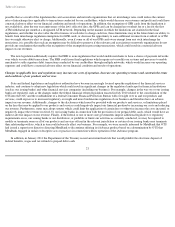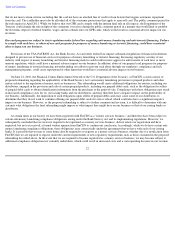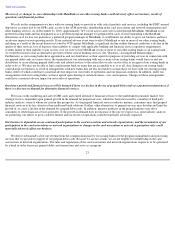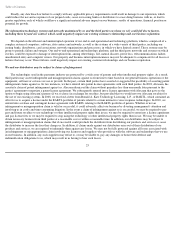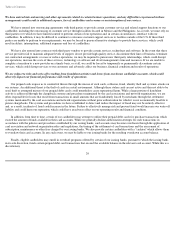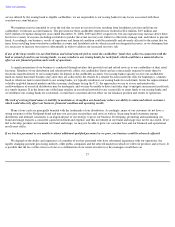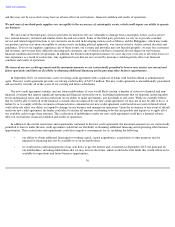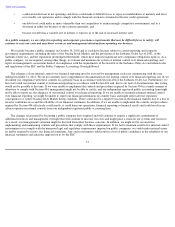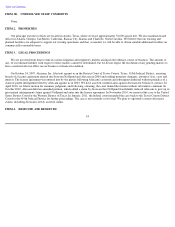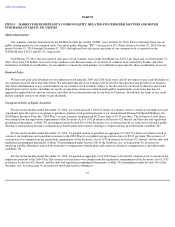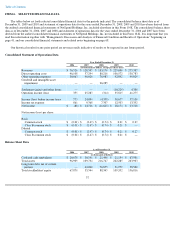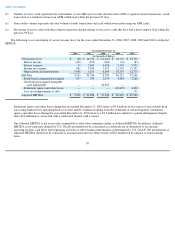NetSpend 2010 Annual Report Download - page 35
Download and view the complete annual report
Please find page 35 of the 2010 NetSpend annual report below. You can navigate through the pages in the report by either clicking on the pages listed below, or by using the keyword search tool below to find specific information within the annual report.
Table of Contents
• a substantial decrease in net operating cash flows could make it difficult for us to repay our indebtedness at maturity and force
us to modify our operations and to comply with the financial covenants contained in the new credit agreement;
• our debt level could make us more vulnerable than our competitors to an increasingly competitive environment, and to a
downturn in either our business or the economy generally; and
• because our debt has a variable rate of interest, it exposes us to the risk of increased interest rates.
As a public company, we are subject to reporting and corporate governance requirements that may be difficult for us to satisfy, will
continue to raise our costs and may divert resources and management attention from operating our business.
We recently became a public company on October 18, 2010 and as such have become subject to certain reporting and corporate
governance requirements, including the rules of the Nasdaq Stock Market, and the provisions of the Sarbanes-Oxley Act of 2002, or the
Sarbanes-Oxley Act, and the regulations promulgated thereunder, which have imposed significant new compliance obligations upon us. As a
public company, we are required, among other things, to evaluate and maintain our system of internal control over financial reporting, and
report on management's assessment thereof, in compliance with the requirements of Section 404 of the Sarbanes-Oxley Act and related rules
and regulations of the SEC and the Public Company Accounting Oversight Board.
The adequacy of our internal control over financial reporting must be assessed by management each year commencing with the year
ending December 31, 2011. We do not currently have comprehensive documentation of our internal control over financial reporting, nor do we
document our compliance with these controls on a periodic basis in accordance with Section 404 of the Sarbanes-Oxley Act. Furthermore, we
have not tested our internal control over financial reporting in accordance with Section 404 and, due to our lack of documentation, this testing
would not be possible at this time. If we were unable to implement the controls and procedures required by Section 404 in a timely manner or
otherwise to comply with Section 404, management might not be able to certify, and our independent registered public accounting firm might
not be able to report on, the adequacy of our internal control over financial reporting. If we are unable to maintain adequate internal control
over financial reporting, we might be unable to report our financial information on a timely basis and might suffer adverse regulatory
consequences or violate Nasdaq Stock Market listing standards. There could also be a negative reaction in the financial markets due to a loss of
investor confidence in us and the reliability of our financial statements. In addition, if we are unable to implement the controls and procedures
required by Section 404 effectively or efficiently, it could harm our operations, financial reporting or financial results and could result in an
adverse opinion on internal controls from our independent registered public accounting firm.
The changes necessitated by becoming a public company have required and will continue to require a significant commitment of
additional resources and management oversight that will continue to increase our costs and might place a strain on our systems and resources.
As a result, our management's attention might be diverted from other business concerns. In addition, we might not be successful in
implementing and maintaining controls and procedures that comply with these requirements. If we fail to maintain an effective internal control
environment or to comply with the numerous legal and regulatory requirements imposed on public companies, we could make material errors
in, and be required to restate, our financial statements. Any such restatement could result in a loss of public confidence in the reliability of our
financial statements and sanctions imposed on us by the SEC.
31


